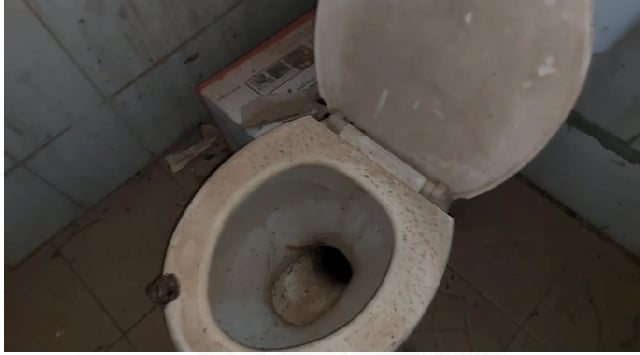The District Chief Executive (DCE) of Ajumako Enyan Essiam in Ghana’s Central Region, Mr. Andrews Kojo Duodu, has expressed profound dismay at the dilapidated state of the official DCE residence, attributing the neglect to his predecessor. Upon assuming office, Mr. Duodu discovered a residence stripped bare and in a state of disrepair, far from the expected condition of a public facility. His inspection revealed a shocking scene of missing and damaged items, including basic necessities like chairs, mattresses, refrigerators, and air conditioners. The overall condition of the bungalow, from the bedrooms and hall to the kitchen, is so dire that it renders the residence uninhabitable, posing a safety risk to any occupant. This gross negligence has left the DCE deeply disappointed and concerned about the misuse of public resources.
The extent of the damage is comprehensive. Not only are vital appliances missing or broken, but even basic furnishings like curtains have been removed. The structural integrity of the building itself is also compromised, raising serious concerns about its safety. Mr. Duodu describes the residence as a “ticking time bomb,” highlighting the imminent danger of collapse if immediate renovations are not undertaken. This situation underscores a broader issue of poor maintenance culture regarding public property, a concern Mr. Duodu intends to address proactively during his tenure.
Forced to seek alternative accommodation, Mr. Duodu currently commutes from Mankessim or resorts to lodging in hotels, incurring additional expenses that could have been avoided. The cost of renovating the residence and replacing the missing items, including essential kitchenware and furniture, will now burden the District Assembly’s budget. These funds, Mr. Duodu argues, could have been allocated to critical development projects within the district, such as improving schools, healthcare facilities, or road infrastructure. The situation presents a stark example of how a lack of accountability and disregard for public resources can negatively impact community development.
Mr. Duodu’s frustration stems not only from the immediate inconvenience and financial burden but also from the lost opportunity to invest those resources in projects that directly benefit the community. He sees the dilapidated state of the residence as a symptom of a wider problem: a lack of respect for public property and a deficient maintenance culture among public officials. This incident underscores the urgent need for greater accountability and responsible stewardship of public resources.
The DCE is determined to instill a sense of responsibility and ensure proper maintenance of the residence following its renovation. He emphasizes that government property belongs to all citizens and should be treated with care and respect. This commitment to preserving public assets reflects his broader vision for responsible governance and efficient resource allocation. Mr. Duodu’s intention is to establish a precedent of accountability and ensure that future occupants understand and uphold their responsibility to maintain public property.
Mr. Duodu’s experience highlights a broader challenge facing Ghana: the need to cultivate a culture of responsible stewardship of public resources. The deplorable state of the DCE residence serves as a stark reminder of the consequences of neglect and the importance of accountability in public office. His commitment to renovating the bungalow and implementing measures to ensure its proper maintenance going forward sets a positive example for other public officials and underscores the importance of preserving public assets for the benefit of the community. This approach not only addresses the immediate issue but also aims to foster a long-term shift towards greater responsibility and accountability in the management of public resources.














